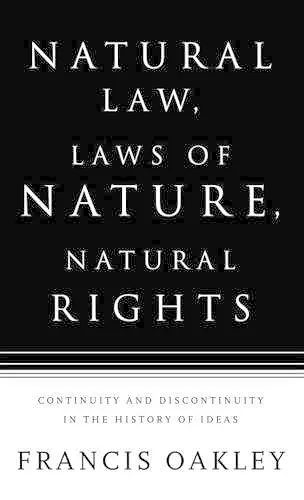Natural Law, Laws of Nature, Natural Rights
Continuity and Discontinuity in the History of Ideas
Format:Hardback
Publisher:Bloomsbury Publishing PLC
Published:1st Dec '05
Currently unavailable, and unfortunately no date known when it will be back

Choice Outstanding Academic Title 2006 The existence and grounding of human or natural rights is a heavily contested issue today, not only in the West but in the debates raging between "fundamentalists" and "liberals" or "modernists in the Islamic world. So, too, are the revised versions of natural law espoused by thinkers such as John Finnis and Robert George. This book focuses on three bodies of theory that developed between the thirteenth and seventeenth centuries: (1) the foundational belief in the existence of a moral/juridical natural law, embodying universal norms of right and wrong and accessible to natural human reason; (2) the understanding of (scientific) uniformities of nature as divinely imposed laws, which rose to prominence in the seventeenth century; and (3), finally, the notion that individuals are bearers of inalienable natural or human rights. While seen today as distinct bodies of theory often locked in mutual conflict, they grew up inextricably intertwines. The book argues that they cannot be properly understood if taken each in isolation from the others.
"Oakley is a scholar's scholar and his book is a gem. This profoundly learned and engaging work takes aim at the controversial American theorist Leo Strauss. He examines the dialectical interplay, over two millennia, between antipodal views of natural law: in the intellectualist view, natural law is immanent in the structure of reality and therefore immutable, while in the voluntaristic or covenantal view, it is imposed on the universe from without and therefore changeable." -CHOICE, July 2006
"This small, but soon to be a classic book is of equal challenge to students of natural law and human rights. In this text and endnotes Oakley critically engages, among others, Strauss, Haakonssen, Tuck, and Shapiro."- Walter J. Kendall III, The Law and Politics Book Review, September 2006
"This excellent book provides a sophisticated but accessible introduction to some fundamental problems in the history of natural law thinking, and the writing throughout is elegant, lucid and persuasive." -Brian Tierney, Catholic Historical Review, 2007 -- Catholic Historical Review
Choice Outstanding Academic Title.
"This book consist of the revised text of the 2001 Curti Lectures in Intellectual History at the University of Wisconsin-Madison...Oakley's overall case for the intimate interconnections between moral and scientific thought is cogent and illuminating. By the same token, he amply demonstrates the possibilities and power of a certain kind of intellectual history. May we see many more books like this one." —Jean Porter, The Journal of Religion, Oct. 2007, Vol. 87, No. 4 -- Jean Porter
"...while Oakley-the-historian feels he should leave Speculation behind in favour of Scholarship, Oakley-the-philosopher is repeatedly drawn back to Speculation and a discussion of why these ideas appeared in the Middle Ages, and it is when he allows himself this guilty pleasure that Oakley's short book is at its most compelling." -Paul Teel, Philosophy in Review
"The argument itself is open to at least three criticisms. First, while Oakley argues that the developments concerning the physical laws of nature led the way for developments in the other two realms, he ends his book with a chapter that traces the origins of natural rights back to the twelfth century, two centuries earlier than the important events in his account of the evolution of the physical laws of nature. Oakley could explain this, I believe, but he does not; it is an obvious question left unanswered. Second, Oakley's Speculative argument is nearly identical to one Michael Foster made in the mid-1930's in the journal Mind, but Oakley—who is aware of Foster's work and has written of it elsewhere—only mentions Foster briefly in the epilogue and an endnote, with no description of Foster's argument. In a book on the history of ideas, this is a surprising omission. Third, although Oakley announces at the book's beginning that he intends to move from Speculation to Scholarship, he in fact fails to make that move decisively..."-Paul Teel, Philosophy in Review -- Negative
" This short book is meaty, but offers a relevant critique of the rise of the modern views of ethics. It suggests that modernity is not anti-medieval, but an extension of a certain form of medievalism, Nominalism. While there is no direct correlate between his thesis and ministry, Oakley offers an important theory about how we are to understand the context in which we do our ministries." -- Mark C. Mattes, Grand View College, Currents in Theology and Mission -- Mark C. Mattes, Grand View College * Currents in Theology and Mission *
ISBN: 9780826417657
Dimensions: unknown
Weight: 322g
144 pages